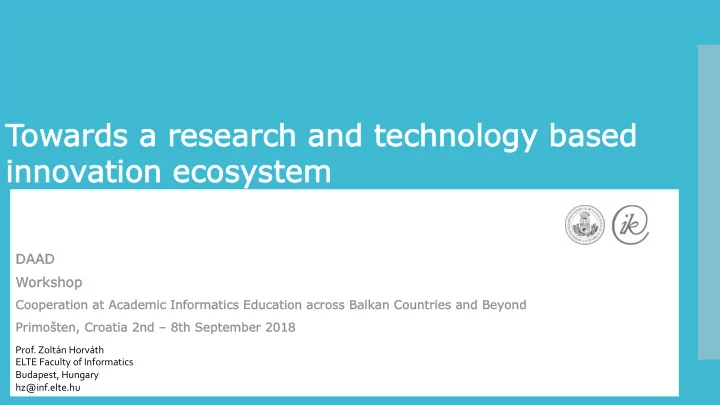

Towards ds a a rese search ch and d te tech chnology gy ba base sed d stem innovati tion eco cosy syste DAAD DAAD Worksh shop p Coope perati tion at t Aca cade demic c Informati tics cs Edu duca cati tion acr cross ss Balkan Countr tries s and d Beyond d Primo š te Pr ten, Croati tia 2nd d – 8th th Septe ptembe ber 2018 Prof. Zoltán Horváth ELTE Faculty of Informatics Budapest, Hungary hz@inf.elte.hu
Currently: R&D&I labs Industry labs built into Master studies Academia- Master program in cooperation with industrial partner industry Industry supported department cooperation Cooperative studies, professional internship models Dual training in mechanical engineering -or how to make more responsive EIT Digital European business development model the universities to the labour market needs Our vision: Innovation ecosystem around the university Spin-off and start-up companies Dual, university-industry employment
Joint Labs integrated into innovation process of a company EIT Digital innovation projects European dimension of projects FP7, H2020 Innovation and entrepreneurship module in MSc programs EIT Digital IDSL program (PhD) Industry Innovation lab Key factors Open innovation Society University
Long-running, innovative software-engineering projects in cooperation with industrial partners Bringing together senior scientists, postdoctoral researchers,PhD and MSc students, professionals from industry-working in teams; the competitiveness of all stakeholders increases University- Benefits-University industry R&D&I projects integrated into education Publications, PhD and diploma thesis work, curricula development participating MSc students → next generation PhD students, earlier results → better joint labs chance of successful PhD Student’s mobility a collaborative model of International cooperation innovation Industrial-like project environment → grow on project management, collective and individual responsibility skills in maintaining high quality and respecting deadline More than 100 students per year Benefits-Industry Results of the projects are used in the software industry The quality of the code is a key factor for industry (even for prototype applications) Industry requires stability and conformance to the specification. University students can produce ”industry quality code The company gets well-trained, creative, experienced graduate students familiar with the company's task system and business model Benefits-Society Improves socio-economic competitiveness Release of the prototype software product with an open-source license
Work plan, weekly consultation with the company 1 person-month tasks project discussions per week teamwork and distributed project management open source tools (version managers, project management tools: trac, viki, mailing lists) virtual meetings, videoconferences tools to collect and redistribute information documentation tools (edoc, latex), test tools (QuickCheck, CruiseControl) and application testing environments; Methodology analyzing results, matching tasks to the next week, long-term planning, algorithms, literature, code analysis; coherent approach, consistent structure, avoid code duplication continuous transfer of knowledge because of the variable composition of teams (documentation, reports) careful selection of topics and tasks free publication; task is aligned with the level of knowledge Typical team: 10-20 (BSc)+MSc and 3-5 PhD students → very diverse group
Teamwork and use of distributed project management open source tools, videoconference and documentation tools understanding and analyzing large-scale industrial code (Identifying language elements in practice, identifying important cases, confidentiality), measuring efficiency and responding Skills and subtask specification critical analysis of each other's work competencies presenting results developed quality and deadlines - responsibility participating MSc students → next generation PhD students, earlier results → better chance of successful PhD industrial-like project environment → grow on project management, collective and individual responsibility skills in maintaining high quality and respecting deadline
• There are several BSc and MSc students working on the subject together with the PhD students Project • CodeChecker is an open source tool: automated debugging in programs without running example: • It has been introduced by a number of Ericsson products instead of the expensive closed solution Static Code • In addition to Ericsson, many other users, such as Mozilla, Clang Static Analyzer and Clang Tidy Analyst Engine Improvements, Apple, Google, Analysis Ericsson, Samsung, Sony, Facebook • Related internships, Google Summer of Code international scholarship, student’s mobility • Close collaboration: meetings, skype meetings, code review, joint mentoring
Project example: P4@ELTE A retargetable compiler for P4
EIT Digital Budapest and EIT Digital Master School
• currently running the third year (2015, 2017, 2018) • Examples: From the asthma monitoring app through the hydroponic system and the cost- grading application to the guitar-enhancing solution and the "applicant tracking system" for bounty hunters, a wide variety of projects were developed Innovation Lab Results • operating companies (eg Pulmoment) • increased career prospects • work at startups, • entry into the EIT Digital Master School Startup awards •
SongArc BSc: ELTE – Microsoft ImagineCup Sydney finalist, 3rd place (game app) MSc: EIT Digital Master School: SSA – Aalto –> ELTE Professional internship: in his own startup, study trip to San Francisco (investors) -> game app – 2,5M downloads
The largest and oldest DTC of EIT Digital Doctoral School Plays leading role in introducing a doctoral training model based on industrial co-financing Number of IDSL students: 8 ELTE, 5 BME, 12 European students EIT Digital (February 2018) Budapest Doctoral Training Centre
IDSL topics (Action Line alignment) OTP Bank Ericsson E-Group Magyar Telekom NOKIA
Start-up company of students at PhD School Their themes are: Software Defined Networking (5G-based network technology) Contributing to the design of Magyar Telekom’s new generation SDN-based data center network LeanNet New direction: Container-based microservice environments SDN based network optimization. MVP before product marketing, open source Looking for an investor
EIT Digital Budapest Accelerator Bulgarian startup (ARISE) Leading business developer: Miklós Gábor € 475,000 in the Nightingale H2020 project Digital Wellbeing Innovation Area - Portable Health Device -> Real-time monitoring of the patient's condition
Thank you for your attention!
Recommend
More recommend